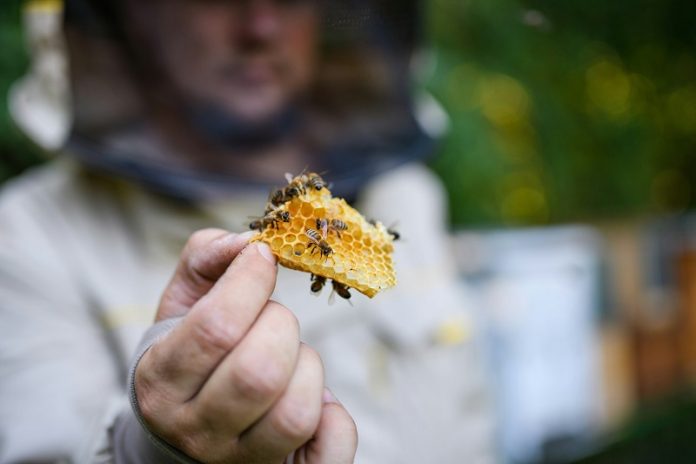
New research has shown that bees, when stressed, are more likely to make negative choices, much like humans do when they feel down.
Bumblebees, as it turns out, may respond to stressful situations in ways that seem similar to emotions in humans, although we can’t know for sure if bees truly “feel” in the same way we do.
Scientists from Newcastle University in the UK have discovered that when bees face a stressful experience, they become more cautious and expect fewer rewards. This change in behavior could affect how they search for and pollinate flowers.
The findings were published in a scientific journal, Proceedings of the Royal Society B, and they highlight how stress can alter the behavior of even small creatures like bees.
To understand how bees react to stress, researchers set up an experiment. They trained bees to recognize colors that represented different levels of reward.
In this case, a specific color signaled that bees would find a sweet reward in one location, while another color indicated a lower reward in a different place. The bees quickly learned which color led to the better reward and acted accordingly.
Once the bees had learned this, the scientists introduced stress into the situation. Some bees were exposed to what felt like a predatory attack — a stressful event for them — while others were left unstressed.
To simulate the attack, researchers used a robotic arm with a sponge to “trap” or shake the bees gently. After this stressful experience, the bees were shown colors that were not clearly linked to either high or low rewards, leaving the bees to interpret the ambiguous situation on their own.
Interestingly, the stressed bees were less likely to take risks or expect a high reward when they saw a color they were unsure about. Instead, they played it safe, choosing to visit locations where they thought they would get a smaller reward.
In contrast, bees that weren’t stressed seemed more optimistic and were more likely to assume they would find a better reward in those uncertain situations.
Dr. Vivek Nityananda, one of the lead researchers, explained that while it’s difficult to know exactly how bees feel, their behavior after stress suggests a more pessimistic outlook, similar to how stressed or anxious humans might behave.
“Emotions are complex,” Dr. Nityananda said. “In humans, they involve a personal understanding of what we’re feeling. We can’t know if bees experience emotions the same way, but their behavior points to something like a pessimistic response when they’re stressed.”
This study is significant because it shows that even tiny insects like bees can experience emotion-like reactions, which in turn could affect important activities like pollinating flowers.
If stress makes bees less confident in seeking out high-reward flowers, it could influence how effectively they pollinate plants, which is crucial for ecosystems and agriculture.
Dr. Olga Procenko, who also worked on the study, noted that the findings suggest emotional-like states might not be unique to humans or mammals but could be shared by many different animals, including insects.
She mentioned how bees, when stressed, tended to act like someone who expects things to go wrong — a “glass half-empty” mindset.
She said that this research opens up new possibilities for studying how stress affects insect behavior and could help us better understand how bees and other insects respond to environmental challenges.
The researchers also point out that more studies are needed to fully understand the long-term effects of stress on bees. For example, they hope to learn more about how stress changes bees’ decision-making processes when searching for food.
Dr. Nityananda emphasized the need to explore how bees evaluate rewards when they are stressed and to dig deeper into the brain mechanisms that drive these behaviors.
The research raises important questions about how stress might affect bees in the wild, especially as they face increasing environmental challenges such as habitat loss and climate change.
By learning more about how stress influences their behavior, we may also find new ways to help protect these vital pollinators.
The research findings can be found in Proceedings of the Royal Society B: Biological Sciences.
Copyright © 2024 Knowridge Science Report. All rights reserved.



